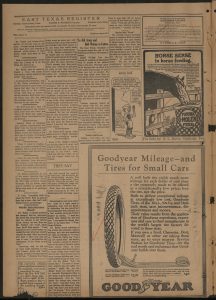Image from the Legislative Reference Library of Texas
Margie Elizabeth Neal
Born: 1875 near Carthage, TX
Died: 1971
Noted For: Margie Neal is noted as a suffragist who was the first woman elected to the Texas Senate, as well as her leadership of an East Texas newspaper that promoted votes for women.
When it comes to being first, Margie Neal was a bit of an overachiever.
After attending Sam Houston State Teachers College (now Sam Houston State University), Margie taught school for a time in Carthage and Fort Worth before moving on to a career in journalism and public service.
From 1903-1911 she served as editor of her hometown newspaper, the East Texas Register, making her one the first women newspaper editors in Texas. Under her leadership, the paper was noted for its coverage of women’s suffrage and other progressive causes supported by Margie.

On the left: East Texas Register in August 1920. Although Margie had moved on from the paper by this date, her influence is still felt in this editorial lambasting a political candidate for his lack of support for women’s suffrage. From the Texas Digital Newspaper Program of the Portal to Texas History.
As the fight for suffrage drew to a successful conclusion, Margie became the first woman to register to vote in Panola County. Later, she became the first woman to serve on the Texas Democratic Executive Committee, and was also a delegate to the Democratic Nominating Convention of 1920.
In 1921, Governor Pat Neff named Margie as a regent for the state’s teacher college system, making Margie the first woman to serve on a Texas board of regents. While serving, Margie grew frustrated with what she felt was a lack of state legislative action to improve public education, and thus decided to run for office herself. In 1926, Margie won a seat in the Texas Senate, making her the first woman to serve in that branch of the state government.
During her four-term tenure, Margie sponsored legislation that mandated physical education and accommodation for students with disabilities, as well as legislation that created a state board of education and the Texas Centennial Commission. She also secured funding for rural education and state teacher certification, and advocated for improved conditions in prisons and mental institutions.
In 1935, Margie transitioned to federal government when she was hired to work for the National Recovery Administration (the administrator of FDR’s “New Deal” initiative) and the Social Security Administration. She remained in these roles until 1945. After her return home to Carthage, she stayed active in community affairs for many years, until she passed away in 1971 at the age of 96. A historical marker in Carthage commemorates her important contributions.
Additional Reading:
Capitol Women: Texas Female Legislators, 1923-1999 by Nancy Baker Jones and Ruthe Winegarten







